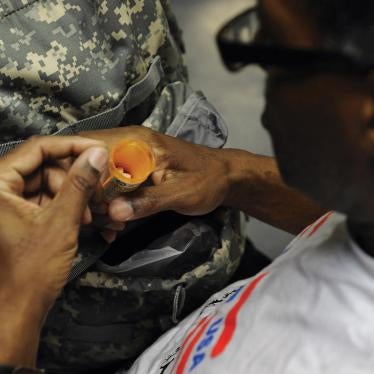An ordinance creating a syringe-exchange program in Atlantic City, New Jersey, provides a lifesaving example of leadership in the fight against HIV/AIDS, Human Rights Watch said today.
In an open letter to local officials throughout New Jersey, Human Rights Watch urged other municipalities to take similar measures to guarantee injection-drug users access to sterile syringes.
Nearly 30 percent of new AIDS cases in the United States can be traced to the sharing of syringes by injection drug users, according to the U.S. Centers for Disease Control and Prevention (CDC). But most states continue to restrict access to sterile syringes by enforcing “drug paraphernalia” laws against needle-exchange program participants and regulating the purchase and sale of syringes in pharmacies. New Jersey is unique among states in imposing an almost total ban on sterile syringe programs for HIV prevention.
The Atlantic City ordinance, which passed 7-1 on June 16, faces a possible legal challenge from the New Jersey attorney general’s office. The state takes the position that municipalities are not authorized to establish needle-exchange programs, although legal experts dispute this claim. Governor James McGreevey has described local needle-exchange programs as “bad public policy,” but has expressed support for a hospital-based needle exchange program run by state authorities.
“New Jersey’s restrictions on needle-exchange amount to a death sentence for many injection drug users,” said Jonathan Cohen, a researcher with Human Rights Watch’s HIV/AIDS and Human Rights Program. “Instead of undermining local HIV-prevention efforts, Governor McGreevey should be upholding access to these lifesaving services.”
Human Rights Watch has documented restrictions on needle-exchange programs and other human rights abuses against drug users in the United States, Canada, Russia, Kazakhstan, Thailand, Bangladesh, and China. According to numerous government-funded studies, including by the National Institutes of Health, needle-exchange programs are proven to reduce transmission of HIV and hepatitis B and C without increasing drug use.





